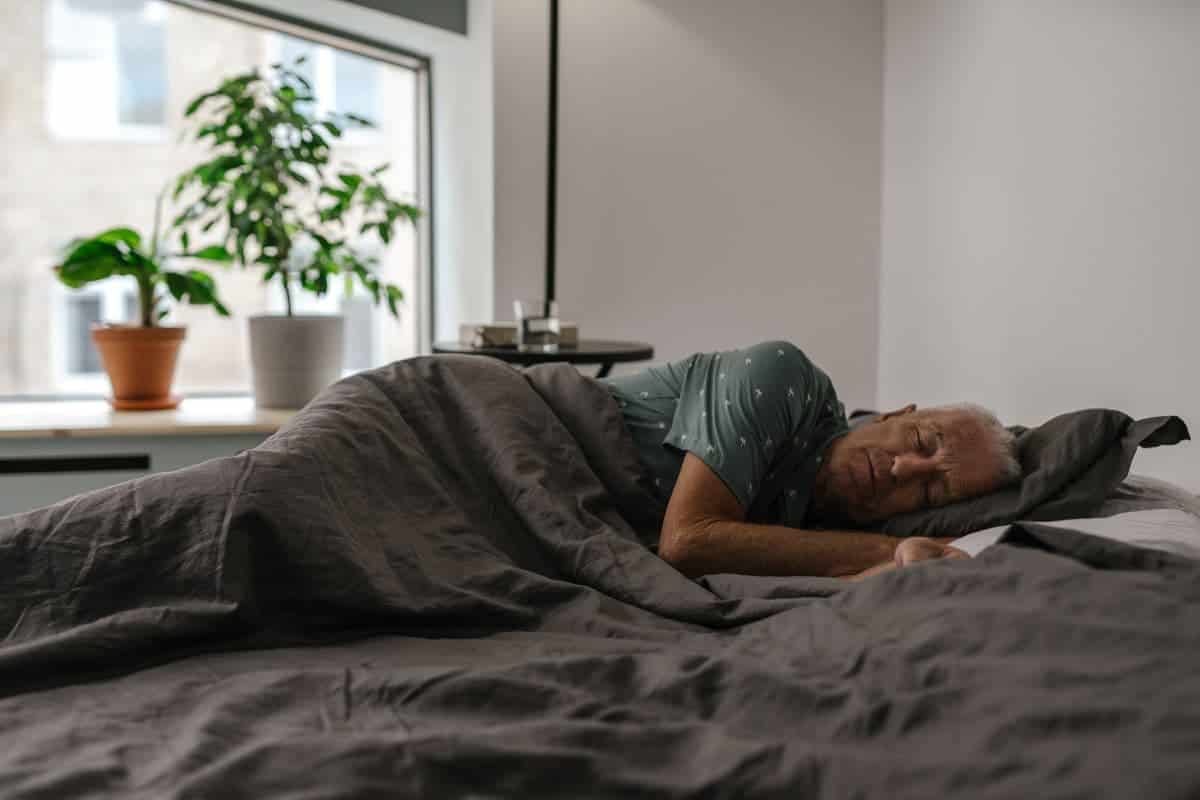This post contains affiliate links.
When people reach old age, it’s common for them to behave differently than in previous decades. While this may be a regular part of the aging process for some, it can also be a warning sign that something concerning is occurring.
An elderly person not eating and sleeping all the time could be because of a medical condition, dementia, or depression. However, you can help them readjust by establishing routines, adding softer foods to their diet, and using modified tableware.
This article will discuss the reasons behind what may be causing an older person to have a disruptive sleep schedule and decreased appetite. I will also cover how you can provide support through action and adjustments.
Why Do Older People Sleep So Much and Eat So Little?
Understanding the factors that lead to older people sleeping more helps in adjusting care for our elderly family members. Let’s take a look at these factors.
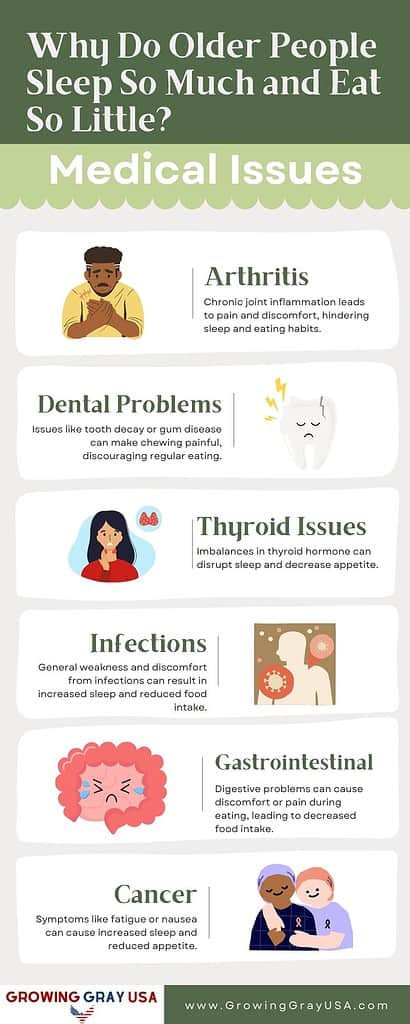
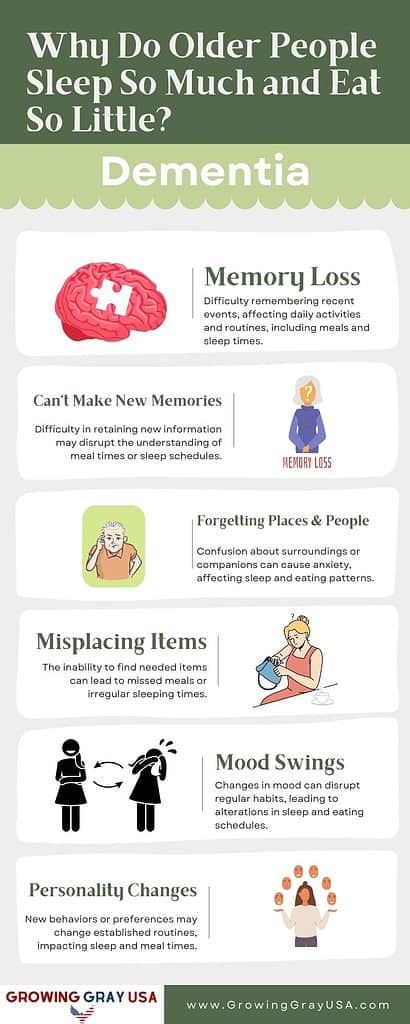
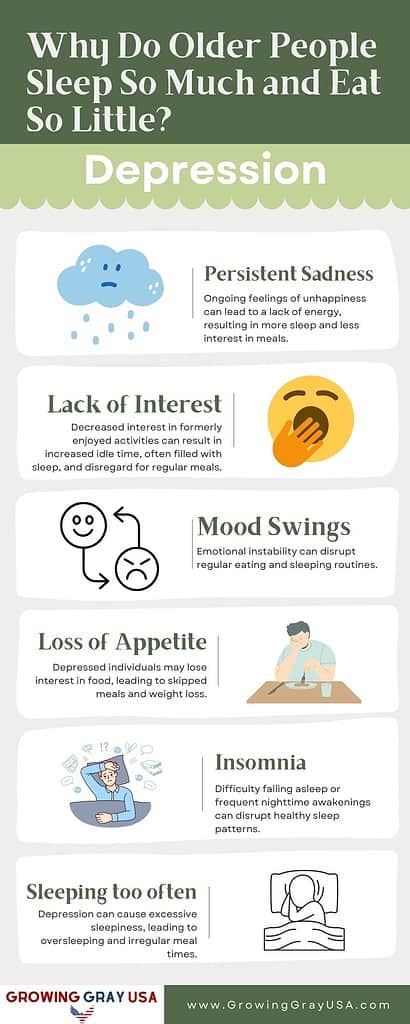
Medical Issues
Not only does this disrupt their sleep schedule, but it also takes away time needed for eating. Without adequate time to eat, they miss out on gaining essential nutrients. Without those nutrients for energy, the cycle of constantly not having the power to stay awake continues.
According to a recent study, over 73% of people over 65 suffer from a medical condition or experience chronic pain.
Some medical conditions that may disrupt sleep and eating habits include:
- Arthritis
- Dental problems
- Thyroid issues
- Infections
- Gastrointestinal issues
- Cancer
These medical issues cause intense body pain that prevents comfortable sleep or falling asleep. This lack of rest throughout the night makes the body fatigued in the daytime. As a result, the person may randomly fall asleep during important tasks, take more naps, or fall asleep at an earlier time than expected.
Additionally, when pain affects areas of the body essential for eating, such as gastrointestinal and dental areas, a person may avoid eating out of fear of further discomfort in their body. This avoidance will result in more harm than good and create even more lasting problems.
Dementia
Dementia is the inability to remember things or reason over time. It arises from damaged nerve cells within different brain areas and is extremely common among people ages 70 and over.
Symptoms of dementia include:
- Memory loss
- Inability to make new memories
- Forgetting familiar places or people
- Misplacing important items
- Mood swings
- Changes in personality
Individuals with dementia are more likely to wake up disoriented in the middle of the night. They may believe it is still daytime or misremember that they never went to bed at all. They might also delay sleeping by completing tasks they forgot they had previously finished earlier.
Disrupted eating routines are also familiar among those with dementia. Dementia causes people to incorrectly recall when they last ate or feel full from a meal that never happened. For some, this may happen occasionally, but for others, it may become more consistent.
Also, elderly individuals with dementia often forget how to complete tasks associated with meal preparation. Recalling recipes and flavors or where to buy food are also common problems—not remembering how to access food results in no food for energy.
Depression
Depression is a mental condition that results in feelings of emptiness, sadness, or dread over long periods. Many older adults have depression due to losing their youth, loved ones, and time.
Symptoms of depression include:
- Persistent sadness
- Lack of interest in hobbies
- Mood swings
- Loss of appetite
- Insomnia
- Sleeping too often
With no interest in hobbies or work, they may fill their time with sleep. Some sleep later, and in severe cases, they may constantly nap throughout the day.
Do you know how much elderlies should sleep during the day? Read my guide to find the answer. How Much Sleep is Too Much for the Elderly?
What You Can Do To Help
You may only need to make small-scale changes to help an older person correct these abnormal habits. However, some cases may require more extreme measures.
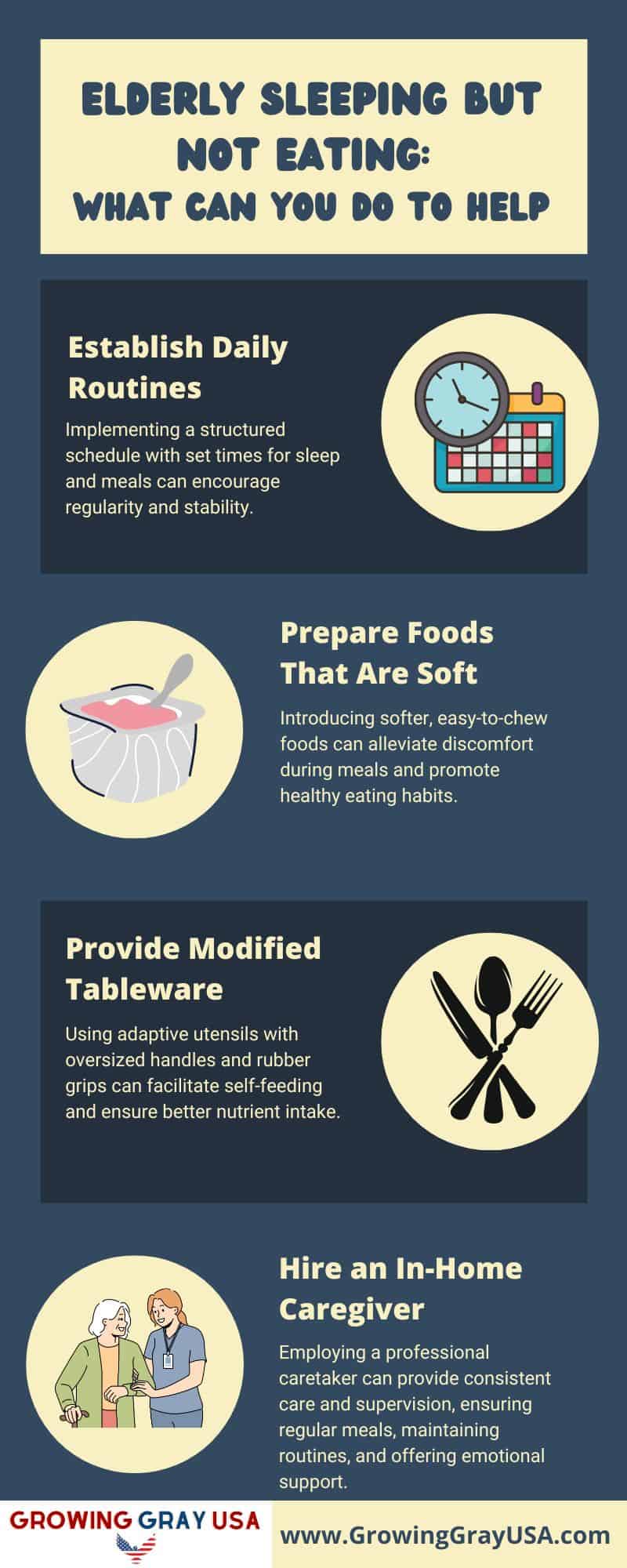
Establish Daily Routines
Routines are critical because they help create regularity. Help set up a timer or alarm clock to go off at the same time every single day. Not only will this serve as an intentional reminder that it’s time to sleep or eat, but it also builds consistency vital to self-regulation.
Routines are also an excellent way to track when they have been following a schedule. If they miss a bedtime or meal, readjust the alarms for the future.
Prepare Foods That Are Soft
These softer foods are less painful to chew and easier to digest for sensitive stomachs. They don’t have to make up the entire diet but should be incorporated throughout all meals.
Examples of soft foods to prepare include the following:
- Yogurt
- Canned fruits and vegetables
- Applesauce
- Puddings
- Smoothies
- Oatmeal
- Soups
Provide Modified Tableware
As aging and medical issues decrease muscle strength, older people struggle with picking up utensils to feed themselves. Working with traditional cutlery can lead to more food left on the plate than in their stomachs.
Supply utensils with oversized handles and rubber grips to make eating more accessible. With the hassle of strained eating resolved, they can get the necessary energy for daily activities and implement more independence.
If you’re looking for a complete utensil collection designed for those who grapple with gripping things, I recommend this Special Supplies Weighted Non-Slip Utensils (available on Amazon.com). They feature a wide, non-slip grip and are made of stainless steel, so they’re extra durable.
Hire an In-Home Caretaker
While this is usually necessary in severe cases, having a caretaker who is always around can significantly assist an older person struggling to maintain healthy habits.
They can provide extra comfort and ensure access to timely meals, maintained routines, and emotional support. Sometimes, an older person may need to be moved to a full-time nursing home to regularly accommodate more of their daily needs.
If you’re looking for tools to help manage these issues and bring more ease and independence into your elderly loved one’s life, consider Lively’s Jitterbug products. These devices, designed specifically for seniors, provide simplicity, reliability, and safety. They include easy-to-use smartphones, medical alert devices, and health and safety services. A Jitterbug product could be the perfect companion to help maintain communication, safety, and health for seniors. Check out their products here.
Final Thoughts
Sleeping constantly and eating less are considered an expected part of aging, but they can stem from something regarding physical or mental health. These behaviors are detrimental to the overall quality of life if not corrected.
However, you can make various accommodations to provide the best care. Whether changing up parts of the daily routine or seeking additional care services, it’s possible to help an older person get back on track toward healthier habits.
Tenuto Properties LLC dba Growing Gray USA is a participant in the Amazon Services LLC Associates Program, an affiliate advertising program designed to provide a means for sites to earn advertising fees by advertising and linking to Amazon.com. We also participate in other affiliate programs which compensate us for referring traffic.


